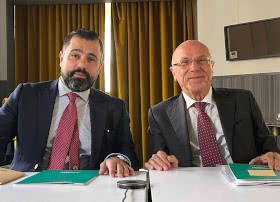
Warning that the rail freight sector, which counts
over 15,000 workers, is heading towards a crisis, today
Fermerci, the association of operators in this segment of the
has presented the government with a package of
Ten proposals to save the sector. "We are - he explained
the president of Fermerci, Clemente Carta - very concerned about the
Cut of 55 million euros earmarked for 2024 to the sector
railway. This decision will produce a reduction
resources allocated to new wagons and locomotives for
rail freight transport, seriously compromising the
operational and financial capacity of companies in the sector
logistics". Remembering that companies in the sector
had planned strategic investments based on the measures
approved in July 2023 by the European Commission,
Carta specified that "these investments, for a value
of €700 million was used for the purchase of 196
new locomotives. However - he noted - the cut in funds puts
the implementation of these essential projects for the
modernisation of the sector and the transition to high-speed transport
low carbon emissions". "In addition to the cut in
incentives - added Carta - a series of operational and
infrastructure is severely affecting the capacity of the
companies to guarantee an efficient service. The interruptions of the
railway lines due to the infrastructure works of the PNRR, which
will continue until 2026, have already reduced capacity
rail transport by more than 50% in 2024, with peaks of 60%
during the summer months. These interruptions not only slow down the
delivery times, but seriously compromise competitiveness
of Italian companies operating in freight transport".
Ferrci recalled that, to further worsen the
situation, from 2023 until today have been the closures of the
main Alpine passes such as the Frejus and the Gotthard, which
restrict access to European markets, creating bottlenecks
in the national logistics system. "This situation -
continued Carta - is putting pressure on the entire sector.
In addition, the recent floods in Emilia-Romagna, together with the crisis
of the Red Sea, have contributed to a collapse in traffic
railway. In 2023, the sector experienced a decline of 3.2%
compared to the previous year, and the forecasts for 2024 indicate
a further loss of 6.7%, with an estimated economic impact of
90 million euros of loss of turnover for the entire sector.
These alarming data project similar scenarios for the following
two years, putting at risk not only the companies but also the 15,000
workers employed in the sector".
 Highlighting that the conditions in which operators in the sector
rail freight are forced to work make the situation
no longer sustainable, Carta denounced that "this
creates profound hardships for the Italian industrial system and economies
Local. We strongly ask the government - he said - a
urgent action to avoid a disastrous crisis from the
unpredictable consequences".
Highlighting that the conditions in which operators in the sector
rail freight are forced to work make the situation
no longer sustainable, Carta denounced that "this
creates profound hardships for the Italian industrial system and economies
Local. We strongly ask the government - he said - a
urgent action to avoid a disastrous crisis from the
unpredictable consequences".
Fermerci's proposals to avert this crisis start
by the request for an immediate restoration of the funds already
envisaged, to ensure the continuation of investments in the
new locomotives and railway wagons, and by better
planning of rail disruptions by ensuring a
more effective coordination of infrastructure works in the
PNRR with operators, minimising the negative impact on the
carrying capacity. Doubling is also required
of the contribution for the national Ferrobonus until 2026, for
incentivise the use of rail transport over rail transport
the +20% increase in the contribution provided for by the Rule
Freight until 2026, supporting companies facing
increasing operating costs, the creation of a regional Ferrobonus,
with the implementation of incentives in each Region where there is no
present, and the creation of a port Ferrobonus to incentivize
the railway manoeuvre in ports, with economic support from
Port System Authorities, to strengthen the
freight transport by train.
Finally, Fermerci asks for vouchers for staff training
providing contributions directly to students to encourage
the acquisition of skills in the railway sector, the implementation of
of the digitalisation measures of the NRRP in order to accelerate the
digitalisation of the industry to improve operational efficiency and
competitiveness, the easing of
Bonus payment by simplifying procedures
to ensure rapid access to funds and
incentives for the sector and the introduction of support for the
to cover the costs that railway undertakings
will have to bear for the adaptation of the
ERTMS European system for the management, control and
protection of rail traffic.
Reiterating Fermci's willingness to collaborate with
the government and all the competent institutions to identify the
solutions necessary to overcome this crisis, Carta underlined
the importance that "the railway freight sector is
recognized as strategic for the future of our country, both by the
from an economic and environmental point of view".